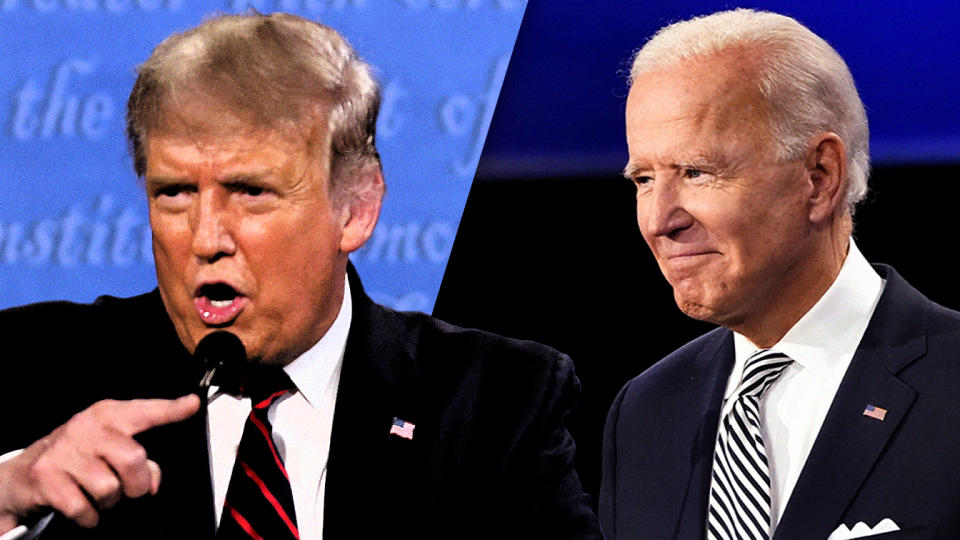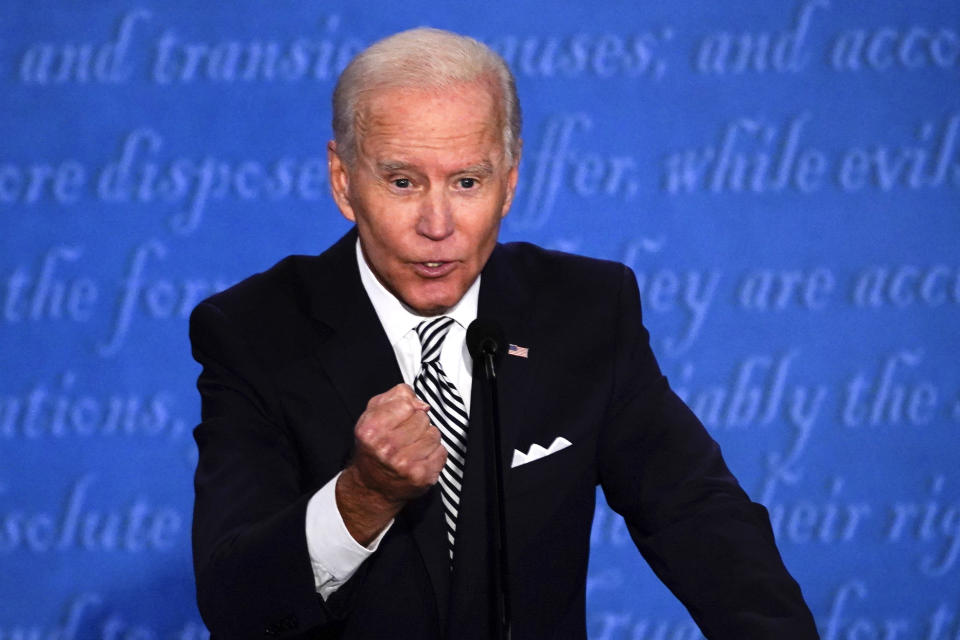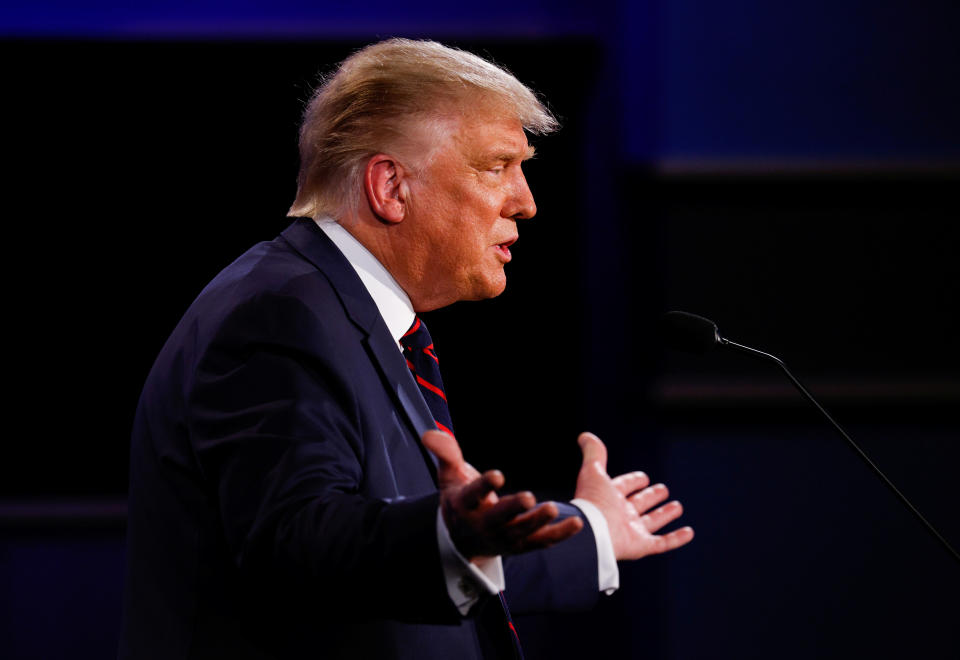4 takeaways from the most juvenile presidential debate in U.S. history
After months of anticipation, President Trump and his Democratic rival, former Vice President Joe Biden, finally met onstage in Cleveland Tuesday night for the first presidential debate of 2020 — perhaps the single most important moment of the fall campaign.
But “presidential debate” is too dignified a phrase to describe what actually went down Tuesday at Case Western University. “Foodfight” is the more fitting term — with one candidate, Trump, determined to sling a torrent of false and misleading attacks at his Democratic opponent, and the other, Biden, often struggling to reach the end of a sentence without getting sidetracked by Trump’s haranguing interruptions.
“Gentlemen! I hate to raise my voice, but why should I be different than the two of you?” moderator Chris Wallace of Fox News was forced to shout after the umpteenth unintelligible spat of the evening. “I think that the country would be better served if we allowed both people to speak with fewer interruptions. I’m appealing to you, sir,” Wallace said, turning to Trump, “to do that.”
“Well, and him, too,” Trump muttered, gesturing toward Biden.
“Well, frankly, you’ve been doing more interrupting than he has,” Wallace retorted.
“Well, that’s all right,” Trump continued, “but he does plenty.”
“Well, sir, less than you have,” Wallace said.
Such was the level of discourse throughout the evening, thanks to Trump. Here are four takeaways from the most juvenile presidential debate in U.S. history.
Trump tried to rattle Biden — but it probably wasn’t enough to shake up the race

Despite a series of real-world upheavals — the COVID-19 pandemic, the resulting economic collapse, a racial reckoning in the streets — the presidential race between Trump and Biden has remained remarkably stable. Exactly one year ago, Biden was leading Trump by 7.6 percentage points, on average; today, Biden is ahead by 7. If the election were held right now, forecasters predict that Biden would win 331 electoral votes.
This means that — with 35 days to go until Election Day and voters already beginning to cast ballots in many states — the onus Tuesday was on Trump to change a trajectory that has proven stubbornly resistant to even the most momentous developments.
If nothing else, you can say this about the president’s performance: He certainly tried.
Trump arrived in Cleveland with a single-minded strategy. After years spent crafting a caricature of Biden as an enfeebled old man who can barely function without the aid of teleprompters, earpieces or performance-enhancing drugs, Trump’s goal Tuesday was to do or say whatever was necessary to trip Biden up and make him lose his train of thought. The hope, it seemed, was that Biden’s rattled missteps would be cut together for viral videos designed to advance that narrative — hence the incessant interruptions.
In a narrow sense, Trump’s strategy was effective. Unable to get a word in edgewise, Biden did not deliver his sharpest performance during the debate’s defining first half, though he improved as the night went on. Trump’s campaign and its allies at Fox News quickly seized on the moments when Biden stammered or stumbled as evidence that the former vice president had lost a step.
But in a broader sense, Trump may have failed to do what he actually needed to do: sway the very small number of remaining undecided voters — a mere 4 percent of the electorate, according to most polls — to his side.
According to one pre-debate survey, 60 percent of swing voters said that the coronavirus pandemic (30 percent) and health care (30 percent) were the top issues facing the United States. Zero percent said “Hunter Biden,” a topic Trump returned to again and again throughout the night.
Sure, Biden may have been flat at times. But he was also coherent, clearing the incredibly low bar Trump had set for him — despite all the interruptions.
“Will you shut up, man?” Biden snapped at one point. “This is so unpresidential."
Biden attempted to keep his focus on ordinary Americans

During the debate, one of Trump’s tactics was to try to drive a wedge between Biden and the left wing of his own party.
“You just lost the radical left,” the president said when Biden reiterated, to no one’s surprise, that he is not and has never been a supporter of the Green New Deal — in effect helping Biden make his case to moderate voters that he is not too liberal.
To some degree, left-leaning Twitter was disappointed with Biden’s performance — particularly when he failed to deliver punchy comebacks to Trump’s most outlandish claims or seemed to spend more time complaining about the president’s lack of decorum (“Folks, do you have any idea what this clown is doing?”) than prosecuting the case against him.
Yet Biden had a strategy, too, and it’s one that arguably made more electoral sense than Trump’s. At every turn — no matter what sort of distraction Trump was creating — Biden pivoted back to how his policies and the president’s would affect working Americans.
“We want to talk about families and ethics?” Biden said, when Trump brought up his son Hunter yet again. “His family, we could talk about all night. This is not about my family or his family. It’s about your family. The American people.
“He doesn’t want to talk about what you need,” the former vice president continued, looking squarely at the camera. “You.”
In a muddled debate, it was the closest Biden came to a thesis statement. He went on to argue that the American people need many things: expanded access to health care, continuing protections for preexisting conditions, “safety” from COVID-19, “more money” so schools and businesses shuttered by the pandemic can reopen, and a president whose word they can trust.
“Do you believe for a moment what he’s telling you, in light of all the lies he’s told you about the whole issue relating to COVID?” Biden asked. “He still hasn’t even acknowledged that he knew this was happening, knew how dangerous it was going to be back in February, and he didn’t even tell you.
“He panicked — or he just looked at the stock market, one of the two,” Biden went on. “Because, guess what, a lot of people died — and a lot more are going to die unless he gets a lot smarter, a lot quicker.”
Tellingly, Trump didn’t respond by defending his handling of the pandemic or reaching out to the “forgotten men and women” of the United States who have been affected by it. All night, the president was argumentative without making any kind of cohesive argument for his candidacy.
Instead, Trump took personal offense when Biden insulted his intelligence.
“Don’t ever use the word ‘smart’ with me,” Trump objected. “There’s nothing smart about you, Joe.”
Likewise, when Trump mocked Hunter, who was discharged from the Navy Reserve in 2014 after testing positive for cocaine, Biden delivered an empathetic, direct-to-camera appeal to military families and Americans struggling with addiction.
“My son, my son, my son — like a lot people, like a lot of people you know at home — had a drug problem,” Biden said. “He’s overtaken it, he’s fixed it, he’s worked on it. And I’m proud of him. I’m proud of my son.”
Biden’s pitch may not have been the flashiest. With all the crosstalk, it may not have come through as clearly as it could have. But in substance, it’s the same kind of populist, meat-and-potatoes approach that helped Trump connect with late-breaking swing voters in 2016. By ceding that ground to Biden on Tuesday night, Trump did little to win those voters back.
Trump again refused to condemn white supremacists

In the age of social media, presidential debates are often more about individual moments than either candidate’s overall performance. And one moment in particular may continue to shape the campaign in the days and weeks to come.
With the memory still lingering of Trump’s controversial claim that “very fine people” had attended a 2017 white supremacist rally in Charlottesville, Va., Wallace gave the president a chance Tuesday night to condemn those on the right who have incited violence at more recent protests.
But Trump resisted, even as Wallace repeatedly pressed him to speak out.
“Are you willing tonight to condemn white supremacists and militia groups and to say that they need to stand down and not add to the violence at a number of these cities, as we saw in Kenosha, and as we’ve seen in Portland?” Wallace asked Trump.
“Sure, I’m willing to do that, but I would say that almost everything I see is from the left wing, not from the right wing. I’m willing to do anything. I want to see peace—”
“Well, then, do it, sir,” Wallace interrupted.
“Say it,” Biden interjected. “Do it. Say it.”
“You want to call them, what do you want to call them?” Trump replied. “Give me a name. Go ahead, who would you like me to condemn?”
“White supremacists,” Wallace interjected.
“Proud Boys,” Biden added, referring to the group of self-described “Western chauvinists” whose members appeared alongside white supremacist groups at the 2017 Unite the Right Rally in Charlottesville, and have been a consistent presence during more recent clashes in Portland, Ore.
“Proud Boys, stand back and stand by,” Trump said — before immediately pivoting. “But I’ll tell you what, somebody’s got to do something about antifa and the left, because this is not a right-wing problem.”
The Proud Boys quickly embraced the moment, posting clips of the president’s comment and even circulating an image with Trump’s quote superimposed over their logo.
Trump has in the past sought to blame violence stemming from some recent protests on antifa, an umbrella term for radical left-wing activist groups that sometimes engage in street brawls.
It’s an assessment that Trump’s own FBI Director, Christopher Wray, and acting Homeland Security Secretary Chad Wolf have both dispelled in testimony before Congress. By their account, white supremacist violence is the most persistent and deadly domestic terrorist threat facing the country.
When Biden cited Wray’s comments. Trump shot back, “Well, you know what? He’s wrong.”
Biden, for his part, said that while he supports peaceful protests, he condemns violence of any kind.
In the wake of Charlottesville, Trump’s approval rating fell below 37 percent for the first time — the lowest level of his presidency — and remained below 40 percent for the rest of the year.
Trump repeated his baseless claim that the election will be ‘rigged’

Another moment that may live on after the debate was the segment where the president of the United States told roughly 100 million Americans that they won’t be able to trust the results of the upcoming election.
“This is going to be fraud like you’ve never seen,” Trump said.
As “evidence,” Trump peppered the television audience with an array of out-of-context remarks about small incidents that were largely examples of errors by election workers affecting tiny, inconsequential numbers of votes — then suggested again, as he has done repeatedly in recent weeks, that he might not accept the results of November’s election
“If I see tens of thousands of ballots being manipulated, I can’t go along with that,” Trump said.
With comments like these, it’s unclear whether Trump is trying to rationalize a potential loss or whether he’s laying the groundwork to claim victory before the year’s pandemic-induced influx of mail ballots have been fully accounted for.
Either way, Trump’s efforts to delegitimize an American election in advance are unprecedented. They represent what his own FBI director described as “misinformation” that “will contribute over time to a lack of confidence of American voters and citizens in the validity of their vote.”
Trump is “trying to scare people into thinking it’s not going to be legitimate,” Biden responded on stage. But “he cannot stop you from being able to determine the outcome of this election. If we get the votes, it’s going to be all over. He’s going to go.”
—Caitlin Dickson, Christopher Wilson and Jon Ward contributed reporting.
_____
Read more from Yahoo News:


